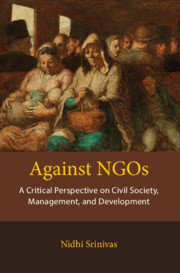'Against NGOs is a fascinating book that brings together two often separated fields: management studies and development studies. Using the Gramscian concept of common sense, the book presents us with a perspective of the pivotal and shifting role NGOs play as agents of development and disseminators of management doctrines, especially in moments of capitalist crisis. It avoids reducing criticism to NGOs only as instruments of exploitation and partners in an order imposed by the Washington Consensus but seeks bases for reconstructing a plural sense for civil society to realize a genuinely emancipatory project. It is essential reading for our times, both for scholars in management studies and development studies and activists involved in the various struggles for a better future.'
Mário Aquino Alves - Professor, FGV São Paulo School of Business Administration
'In this urgent and important book, Nidhi Srinivas contends that NGOs, hitherto seen as the saviors of civil society, are now in danger of being hopelessly coopted by the hegemony of capitalism. Fortunately, this hegemony remains incomplete, and Srinivas uncovers ways in which emancipatory possibilities can be nurtured in the service of ‘The Wretched of the World,’ to recall Franz Fanon's eloquent description. Indeed, Srinivas is, in a sense, one of Fanon's heirs, advocating for an organic bond between theorizing and praxis. I strongly recommend this extraordinary book for researchers in management and organization studies who believe that the best way to live is to make life better for the most disadvantaged among us.'
Raza Mir - Professor, William Paterson University
'What is the social function of the non-governmental sector within the development, management, and civil society nexus? Nidhi Srinivas examines the frontiers of capital operating in and through NGOs to deliver a major book on the critical limits and possibilities of civil society as a space of emancipation.'
Adam Morton - Professor, The University of Sydney
'Many contemporary accounts of NGOs have critiqued them as being either ‘malign actors’ or ‘futile players’. However, both of these characterizations miss the context within which these organizations presently operate. In this excellent book, Srinivas takes a much more nuanced approach in examining the contexts that NGOs work in by employing the key concepts and practices of Development, Management, and Civil Society. This book takes you on a critical journey through the different historical stages of global capitalism by utilizing an analysis of colonialism, modernism and financial capitalism and their relationship to International Development. I would highly recommend this book to anyone interested in the theories, practices and actions of NGOs more specifically and International Development more broadly.'
Helen Yanacopulos - Professor, The University of British Columbia



